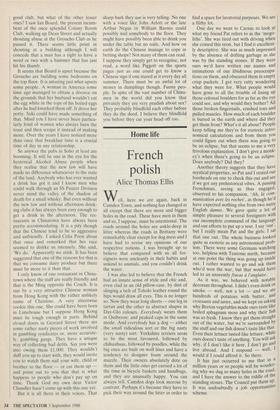Home life
French polish
Alice Thomas Ellis
Well, here we are again, back in Camden Town, and nothing has changed at all except that there are more and bigger holes in the road. These have men in them and so, I suppose, must be intentional. The roads around the holes are ankle-deep in litter whereas the roads in Brittany were remarkably clear except for dog mess and I have had to revise my opinions of our respective nations. I was brought up to believe that compared with us all for- eigners were uncleanly in their habits and unkind to animals, and you couldn't drink the water.
I was also led to believe that the French had an innate sense of style and chic and, even clad in an old pillow-case, by dint of slinging a belt of Toledo leather round the hips would draw all eyes. This is no longer so. Now they wear long shorts — one leg in tartan and the other in abstract shapes in Day-Glo colours. Everybody wears them in Quiberon: and peaked caps in the same mode. And everybody has a dog — either the small ridiculous sort or the big nasty (very nasty) sort. Yorkshire terriers seem to be the most favoured, followed by chihuahuas, followed by poodles, while the big ones are built on wolf lines and have a tendency to designer foam around the muzzle. Their owners absolutely dote on them and the little ones get carried a lot of the time in bicycle baskets and handbags, and they are unusually happy. You can always tell. Camden dogs look morose by contrast. Perhaps it's because they have to pick their way around the litter in order to
find a space for lavatorial purposes. We are a filthy lot.
One day we went to Carnac to look at what my friend Pat refers to as the `mogo- liths'. She was tired out with driving when she coined this term, but I find it excellent- ly descriptive. She was as much impressed by the absence of drifting garbage as she was by the standing stones. If they were ours we'd have written our names and intimations of our libidinous preoccupa- tions on them, and obscured them in empty crisp packets. I got very ratty wondering what they were for. What people would have gone to all the trouble of lining up those colossal boulders for as far as the eye could see, and why would they bother? All those broken fingernails, crushed toes and pulled muscles. How much of each boulder is buried in the earth and where did they get them from? What's it all about? People keep telling me they're for esoteric astro- nomical calculations and from them you could figure out when there was going to be an eclipse, but that seems to me a very frivolous explanation. I don't give a monk- ey's when there's going to be an eclipse. Does anybody? Did they? Another theory suggests that they have mystical properties, so Pat and I rested our foreheads on one to check this out and see if we got any prehistorical vibes. A passing Frenchman, seeing us thus engaged, observed to his companion, 'Alt, la com- munication avec les roches' , as though he'd have expected nothing else from two nutty English dames. We gave quite a lot of simple pleasure to several foreigners with our incomplete command of the language and our efforts to put up a tent. I say `our', but I really mean Pat and the girls: I sat that one out. The whole business looked quite as esoteric as any astronomical prob- lem. There were some Germans watching too, helpless with Teutonic mirth, because at one point the thing was going up inside out. I rather wanted to go and ask them who'd won the war, but that would have led to an unseemly fracas a l'anglaise. As it was, we behaved with notable decorum throughout. I didn't even drink or smoke — well, not a lot — and we ate hundreds of potatoes with butter, and croissants and tartes, and we kept on asking why Breton vegetables made ours taste like boiled sphagnum moss and why their fish was so fresh. I know they get them straight out of the water, but we're surrounded by the stuff and our fish doesn't taste like that. Even their lettuce tasted like lettuce, while ours doesn't taste of anything. You will ask why, if I don't like it here, I don't go and live abroad. And I respond — well, I would if I could afford it. So there.
It has just occurred to me that in a million years or so people will be wonder- ing why we dug so many holes in the road, and I have the answer to the riddle of the standing stones. The Council put them uP. It was undoubtedly a job opportunities scheme.










































 Previous page
Previous page